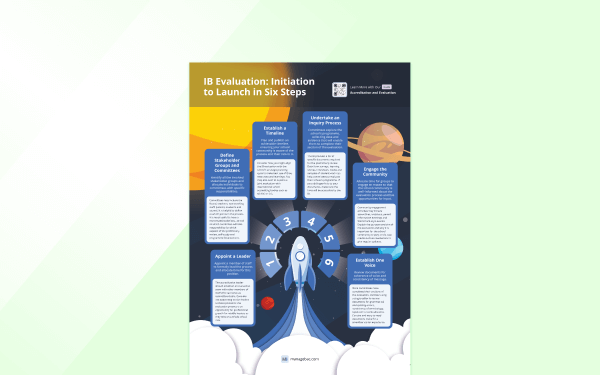
To misquote Benjamin Franklin, for IB educators, the only certain things in life are death, taxes and school visits! IB visits are essential to ensure that the International Baccalaureate (IB) curriculum is being delivered to the required standard, and to give all community members confidence that the school’s development processes have been recognised, valued and supported by outside agencies. I personally would not want to work, or enrol my child, in a school that has no outside agencies overseeing its processes. Having said that, I cannot deny that IB visits, and all the work leading up to them, can cause a school and its leaders some anxiety. This post will help to debunk some misconceptions and alleviate worries about MYP visits.
Visits Need Not Be a Cause of Anxiety
The IB’s aim is to grow its global community of schools and, as such, seek to support schools to have a successful authorisation and evaluation. The 2020 Programme Standards and Practices are designed to provide a framework for consistent, appropriate curriculum delivery, and the evaluation process offers checkpoints and support along the way. Depending on the stage in the process, you will be supported by a Consultant, Programme Leader, Evaluation Leader, Site Leader and/or Site Visitor , and be able to rely on their advice and answers to any queries you might have. The people who fulfill these roles for the IB are also educators who in all likelihood have been in the same situation your school is now. They will be more than happy to offer advice and guidance.Preparation Is Key
The IB provides extensive guidance and support to schools, but there is a lot of information to process. Here are some pointers to help organise your school.- Follow the Candidacy Support Guidance and definitely ask your Consultant questions.
- Plan several meetings to conduct professional development sessions in order to create strong Subject Group Overviews as a foundation for the curriculum.
- Draft an ATL map together with your team with a general overview by year level, adding more specificity to each subject group. (ManageBac support this functionality.)
- Write policies that follow the Guidance and are in line with IB expectations; ensure collaboration meetings are held with school stakeholders.
- Build collaborations with the local community for MYP Projects and prepare the team for moderation.
- Follow the preliminary review checklist when preparing for an evaluation visit.
- Write or review your policies with all stakeholders involved.
- Crosscheck that the information is consistent across the Admissions, Academic Integrity, Assessment, Inclusion and Language policies:
- Show that the Inclusion Policy follows on consecutively from the Admission/Access Policy;
- Provide a rationale and examples for how the school supports students through the admissions process;
- Note that Assessment only works with Academic Integrity at the forefront;
- Show that language courses on offer at the school are supported in Inclusion and Admissions policies.
- Don’t reinvent the wheel with the Programme Development Plan. This should be something that you are already doing as a school, and if you have a coordinated visit with another accreditation team, these action plans can align.
- Review how you approach Service, ATL Skill Development and Interdisciplinary Units. These areas are typically written as recommendations, as they can be difficult for schools to fully comprehend and implement well.
Preparing teachers, parents and students for the visit
Some stakeholders may feel nervous or unsure as to why a visit is happening. Misconceptions can form, such as: 'Is the school in trouble?', 'Is this an inspection?', 'Will we lose our IB authorisation if we fail the visit?', 'Will my personal performance be under review?'. It is important to dispel these misconceptions by sharing the purpose of the visit with the school community. Ideally, all stakeholders would have been involved in creating and updating the school’s policies, mission and vision, but questions and concerns do still arise. The following points are some suggestions to help prepare teachers, parents, and students for a visit:- Communicate as early as possible about the reasons for the visit, who will be visiting, and what will happen.
- Organise and share the visit schedule well in advance to ensure stakeholders know when they will be needed.
- Prepare and practise answers to some sample questions that could be asked regarding the Programme Standards and Practices.
- Always alleviate any fears by noting that the IB are visiting to support and help the development of the school’s programme. The visiting team should be seen as guides for the school, not an inspection team.
Celebrate What You Have Achieved
After the visit, there should always be a team celebration for having reached a milestone or completed another stage with the IB. After all the hard preparation work, time should be made to reflect and enjoy what the group was able to accomplish. Additionally, once the full report is published, it is recommended that the team identify areas for development and begin to plan for the next evaluation cycle. The most effective teams will plan how to build on the visit to make their school even better for the next time.ManageBac Supports the Process
ManageBac supports the evaluation process. Here are a number of ways in which it makes the evaluation visit easier:- All curricula are housed in one place including Subject Group Overviews, ATL Skill Development, Assessment, and Unit Plans.
- Service as Action portfolios and reflections can be easily viewed and downloaded by the evaluation team.
- Personal and Community Projects are saved together with process journals, assessment grades and student reports.
A Journey, Not a Destination
No one ever has all the answers, and this is especially true of the IB authorisation and evaluation process. It is therefore important to keep asking questions and to remain open-minded in your IB journey. The most effective resources at your disposal are other people. As administrators, we have to trust and rely on the expertise of others within our schools and beyond. This blog stands as an example of the support mechanisms to help you along the way. Don't hesitate to connect with me with any additional questions. I am always happy to collaborate. Good luck on your MYP journey! More resources to help: Guide to Evaluation and Authorisation EBook Projecting your authorization timeline - International Baccalaureate® (ibo.org)About the Author

Jarrett Brown is currently the Secondary Principal at ISA International Education, Wuhan, China. He has been an MYP Coordinator and taught DP History, DP Language and Literature, MYP Language and Literature, MYP Individuals and Societies (I&S), MYP Language Acquisition, CAS and Personal Project. He is an MYP workshop leader, site visitor, reader, and building quality curriculum (BQC) senior reviewer, as well as an MYP subject leader for ManageBac.
The Learning Management Digest
Subscribe today to receive our latest resources, events, updates and so much more – specially curated for you, and delivered straight to your inbox.

